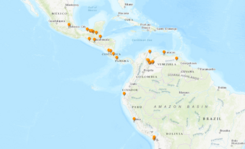Mapping of safe spaced services and referral pathways
A focused mapping of Safe Spaces related services adhering to basic humanitarian principles commenced with Mexico, Guatemala, Costa Rica, Colombia and Venezuela. Working with a diverse range of partners in these countries, they identified gaps in service provision and strengthened coordination around referral pathways for different profiles of persons of concern.
From this alliance, both a physical and an online map showing the geographical location of each service as well as which organizations offer multiple services among the five countries were developed in order to facilitate referrals in the surrounding geographical area and particularly along the transit routes across countries.
Cross-border coordination
The RSSN ensures coordination between safe spaces at local and national levels. Its core members worked in close consultation with all other members that are spread across different locations to develop standards, tools, and policies. The resulting Terms of Reference (ToR) establishes the main objectives and interventions of the Network and outlines the roles of the different members. Additionally, a regional plan of action guides the implementation towards contextualized work plans. Tools for advocacy, capacity building, and information management were also developed jointly to increase the quality and impact of services.
Setting minimum standards: the RSSN self-audit checklist
The Network developed a set of minimum standards and the RSSN self-audit checklist to measure their implementation. The standards relate to service provision approaches, human resources, information and case management, and accountability to the population served. The checklist helps track changes in local, national and the RSSN over time. The members of the RSSN engaged in a joint audit and compiled the outcomes of individual organizations into a regional self-evaluation. The progress and gaps identified were used to develop a work plan targeting capacity development, awareness raising, case and information management.
Development of protection tools, guidance and training materials
The SGBV and Child Protection Case Management and Information Management (hereinafter “SGBV/CP CM/IM”) Toolkit assembles several tools in one place for use by UNHCR and its partners. The toolkit includes the SGBV/CP case management and information management workshop tools, the RSSN self-audit checklist, an online service mapping, a research on SGBV disclosure in forced displacement, and a Regional Information Sharing Protocol (RISP) template. This toolkit will be further developed and updated as the Network expands its work.
Capacity building
The RSSN is supported by the UNHCR’s RLU SGBV/CP team in San Jose, Costa Rica. The team provides capacity building, technical support and guidance on global and regional protection standards and RSSN tools to the members of the Network. In total, 474 staff of RSSN member organizations were trained on SGBV/CP principles and RSSN tools in the Americas Region from July 2017 to July 2018.
A Safe Space is a kind of physical or mobile space, where groups or individuals can feel “safe,” build social networks, express and entertain themselves while receiving information and accessing protection and assistance services in accordance with the age, gender and diversity approach, the survivor-centered approach, and the child’s best interests principle.
Referrals means linking survivors, children or other persons of concern to other services, providing information about the case to a different partner or unit and on a need-to-know basis.

